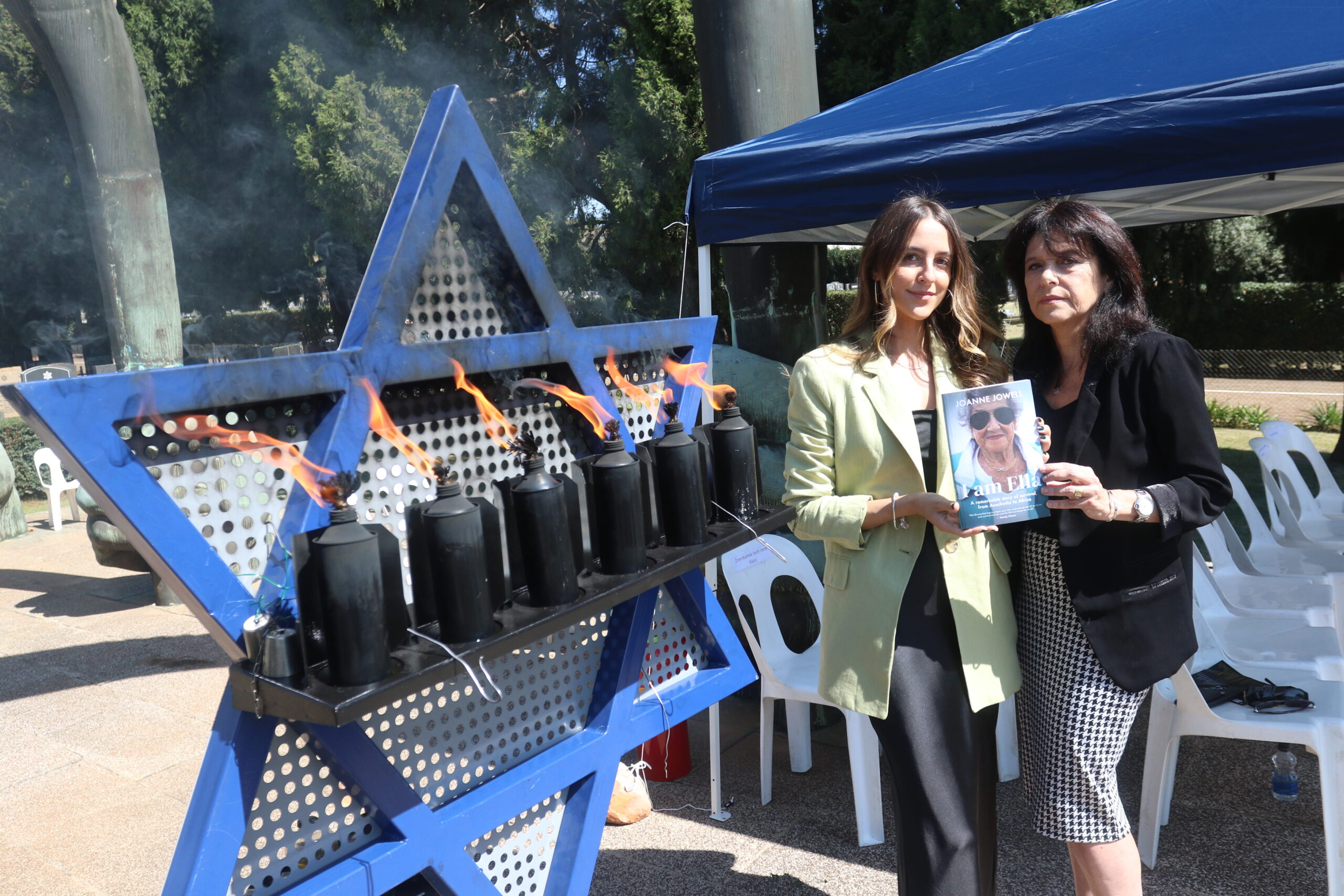click to dowload our latest edition
CLICK HERE TO SUBSCRIBE TO OUR NEWSLETTER


Published
1 year agoon
By
Steven GruzdIn a glimpse of the future, the main speaker at Johannesburg’s Yom Hashoah Holocaust commemoration on 18 April wasn’t there in person. Ella Blumenthal – still feisty, forgiving, and funny at age 101 – instead talked to her daughter and granddaughter in a video.
Blumenthal’s daughter, Evelyn Kaplan, delivered a poignant, heartfelt message from the podium. As the number of Shoah survivors around the world dwindles, the succeeding generations will be called on to perpetuate the memories of the six million Jews murdered in the Holocaust between 1933 and 1945.
Blumenthal was a survivor of the Warsaw Ghetto Uprising – when Jews took on the might of the Nazi army in Poland’s capital exactly 80 years ago, on 19 April 1943. Their fearless heroism against insurmountable odds led Israel in 1959 to choose this day to commemorate the Shoah, following a Knesset resolution in 1951.
Blumenthal also survived the camps of Majdanek, Auschwitz, and Bergen-Belsen. Remembering April 1943, she recalled the shooting and Molotov cocktails being hurled at German soldiers. They were taken by surprise, and the Jews held out for days, before the rebellion was mercilessly crushed and the ghetto set aflame.
“The sight will be forever in my mind,” Blumenthal said in the video, “I can never erase it. The smell of burning feathers from the bedding will forever be in my nostrils.”
She also spoke of being miraculously released from inside a gas chamber with her niece by an SS soldier, who said, “You are not going to be gassed today.”
Blumenthal’s story is beautifully told in the award-winning 2021 documentary I Am Here.
She retains the happiness of her pre-war childhood. “I was very naughty. I still am,” she said with a twinkle in her eye.
“G-d spared me to be here today,” Blumenthal said. Her positive outlook and optimism shine through her words. “I wake up every day to see the world, the light coming in. I never close my curtains. I want to see the dawn coming in. Baruch Hashem, ani po (Thank G-d, I am here). I went through suffering and tragedy, but you have got to carry on. The world is beautiful. Be thankful to have another day.
“I never lost my faith in Hashem, even in the darkest of days,” Blumenthal said. “I survived, I lived, to tell the world about it.”
Her message was, “It’s so wrong that people fight with arms. We shouldn’t blame each other for being different colours or religions. We must sit down and exchange views – we are all one nation, we’re all the same, G-d’s creations.”
No less powerful were the words of Ella’s daughter as a second-generation survivor. Kaplan said that she knew in her bones from a young age that her family was different. She had no grandparents, uncles, and aunts. She sensed that her mother needed protecting from further harm for the rest of her life. She remembers her mother screaming from nightmares, where her children were being taken away from her. A single framed black-and-white photograph was the only remnant of her mother’s entire family. Of the 25 of them, 23 were killed in the Shoah.
“You don’t understand it, but you accept it,” said Kaplan. “As you get older, you begin to process it all, struggle with it.” She saw that her mother wasn’t defined solely by her past, but was full of “life, verve and vigour.” She was “strong, sassy, feisty and forthright”.
“The Holocaust didn’t end in 1945. Its impact on the younger generation was so profound. It altered your genetic code … Genocide continues to wreak havoc on future generations,” Kaplan said.
For her, the COVID-19 lockdown was, strangely, a blessing, because her mother moved in with her. She and her family had the precious gift of more quality time with this remarkable, inspiring woman. At 101, Blumenthal has mastered social media, and keeps in touch with her family around the world.
“I learned from her that hatred begets hatred. I was passed on her baton of tolerance and understanding,” Kaplan said, “Losing her parents, her brothers, her aunts, and uncles was unfortunately not extraordinary at that time. But going on to love, to talk, to write … to have a lust and thirst for life – that was extraordinary.”
The moving ceremony, organised annually by the Gauteng Council of the South African Jewish Board of Deputies, retained many of its traditional elements. This included songs and prayers, the lighting of six memorial lamps by survivors and their families, and a message delivered by the deputy ambassador of Israel. Kaddish was led by one of the survivors, Reverend Joseph Matzner.
A flock of pigeons circled above the audience as school leaders read out the names of individuals who perished in the Shoah. This was an omen that they will never, ever, be forgotten. We are here.
